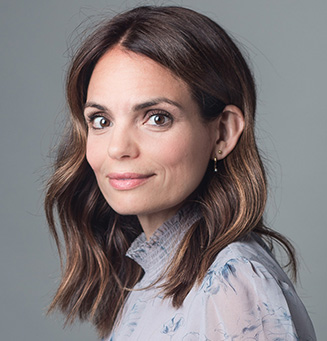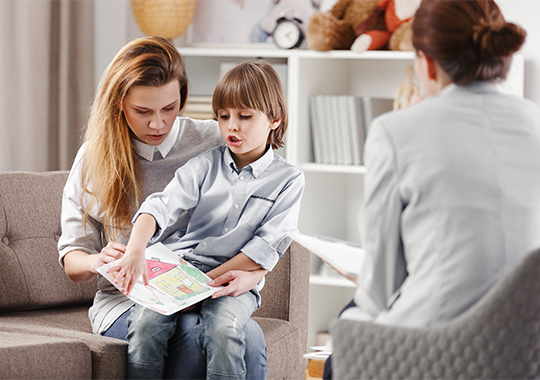Brightening the lives and boosting the health of kids during COVID
Learn how researchers Dr. Marie-Claude Geoffroy at McGill University and Dr. David Nicholas at the University of Calgary are helping address the mental well-being of children, youth, and their families in Canada

Related stories:
The COVID-19 pandemic has been tough on kids. They haven’t been able to do all the normal things that make them happy. They haven’t been able to play organized sports, have playdates or sleepovers with their friends, or visit their grandparents. Instead, they had to adjust to virtual learning or restricted in-person classes and in many cases, their socialization may have been mostly through virtual visits, social media or on-line gaming.
The public health measures and pandemic restrictions have taken a toll on the mental health of children and youth. The situation may be even worse for kids with chronic health conditions, who are at higher risk of serious disease from COVID-19, and who may have had their routine care interrupted because of pandemic restrictions.
It’s good news that kids, aged 5 to 11, in Canada now have access to the COVID-19 vaccine. By getting vaccinated, kids will be protected from the virus, which may alleviate fears for both kids and their parents. While that’s good news, not a lot of research has focused on understanding the mental and emotional impact of the pandemic on children.
Fortunately, with the support of funding from CIHR, researchers from across the country will examine the stressful and traumatic effects of COVID-19 on Canadian children, youth, and their families. The results of this research may help bring joy back into the lives of many children and make sure they get the care they need to stay healthy.
Harnessing the healing power of nature

Dr. Marie-Claude Geoffroy, who’s a Canada Research Chair in Youth Mental Health and Suicide Prevention, will look at how her École à Ciel Ouvert (Open Sky School) program could potentially benefit the mental health of disadvantaged children in Quebec who’ve been affected by COVID-19.
“Since the beginning of this pandemic, I’ve seen École à Ciel Ouvert as an outdoor educational intervention in nature that could work well with another big initiative in Quebec that addresses the effects of COVID-19 on children called the Observatory for Children’s Education and Health,” said Dr. Geoffroy, who’s also researcher at the Douglas Mental Health University Institute Research Centre, and an assistant professor in the Departments of Educational and Counselling Psychology and Psychiatry at McGill University. “With their support, I can examine how extended lockdowns have led to vulnerabilities among children due to lack of socialization or sometimes feelings of neglect.”
Dr. Geoffroy and her multidisciplinary team hope to recruit 2,000 Grade 6 students for École à Ciel Ouvert so that they can evaluate whether learning outdoors in nature can help mitigate the impact of COVID-19 on children’s mental health. They’ll solicit these participants at 133 schools affiliated with the observatory in early 2022.
The program will last for 12 weeks, and classes will take place outdoor parks and green open spaces for two hours per week. That way, the educational change won’t seem too overwhelming for the students and their teachers. These classes will stress cooperation, compassion, and mindfulness.
“We’ll encourage teachers to use educational activities in nature that can involve math, or science, or French,” said Dr. Geoffroy. “For example, students can learn to count with rocks or measure the circumference of a tree. Through use of the salutogenic perspective of learning outside in nature, these students could also look at a leaf attentively and notice that it has small lines.”
So instead of pathogenic studies, where students would examine the cause of diseases, this salutogenic learning process will instead help promote and maintain their physical and mental well-being by focusing on ways to alleviate the negative side effects of the COVID-19 pandemic.
To measure whether École à Ciel Ouvert has been effective, Dr. Geoffroy’s research team will conduct a randomized controlled trial to assess the mental health of students before and after the intervention.
Then, when data have been collected, research results will be posted in accessible terms on an external website. Dr. Geoffroy’s also thinking about creating a documentary that educates teachers around the world about the values of using nature in their lessons.
“Translating our research results to the general public is very important to me,” she said. “Our collaboration with networks such as For Our Kids and Mères au Front, as well as use of social media outlets could also help us realize our goal of positive change that will help reverse any long-term negative mental health impacts of the COVID-19 pandemic on children, youth, and their families.”
Taking care of kids with chronic illnesses

Another researcher who received CIHR funding to evaluate the stressful and traumatic effects of the COVID-19 pandemic on children, youth, and their families is Dr. David Nicholas. As a professor and associate dean of research and partnerships in the Faculty of Social Work at the University of Calgary, he’ll specifically examine how health services during the pandemic have impacted pediatric patients with a range of health problems from different ethnic, cultural, social, and economic backgrounds.
“During the COVID-19 pandemic, how should we decide what’s essential care when a difficult balance needs to be created between public health safety, and patient and family centred care?” asked Dr. Nicholas. “Decision making pathways need to be put in place so that experiences caused by this pandemic and those in the future will be less challenging for children who have pre-existing health conditions and developmental disabilities, such as heart problems, asthma, sickle cell disease, and autism.”
Public health safety and patient care during a pandemic could be enhanced through the development of a plan that mitigates potential challenges related to clinical support for pediatric patients.
“The plan could be created by a group of key representatives who have clear information about steps that need to be taken to optimize care during a pandemic,” said Dr. Nicholas. “This group would consist of those who can address various areas of health concerns for children and their families, as well as public health representatives.”

Planning for a pandemic will also need to address short- and long-term mental health implications, as well as changes to health services.
“In order to create guidelines for the plan’s ethical decision making and support of patients and families,” said Dr. Nicholas, “we must also consider the mental health strain that has emerged in our population at large, and challenges faced by health care providers who have sought to ensure services to all during the COVID-19 pandemic.”
During his study, Dr. Nicholas and his team will collect data regarding the effects of the COVID-19 pandemic on the mental health of children, youth, and family participants through use of interviews conducted at clinics and health units in Ontario, Alberta, and British Columbia.
“The intent of our research is to rapidly translate information into practical guidelines that can be used by the Canadian and international public,” said Dr. Nicholas. “By listening to the impacts of this pandemic on children, youth, and their families, we will communicate our findings to health care providers and hospitals leaders, as well as policymakers, and family members so that pandemic planning and responsiveness can be developed that will ultimately lead to positive change.”
- Date modified: